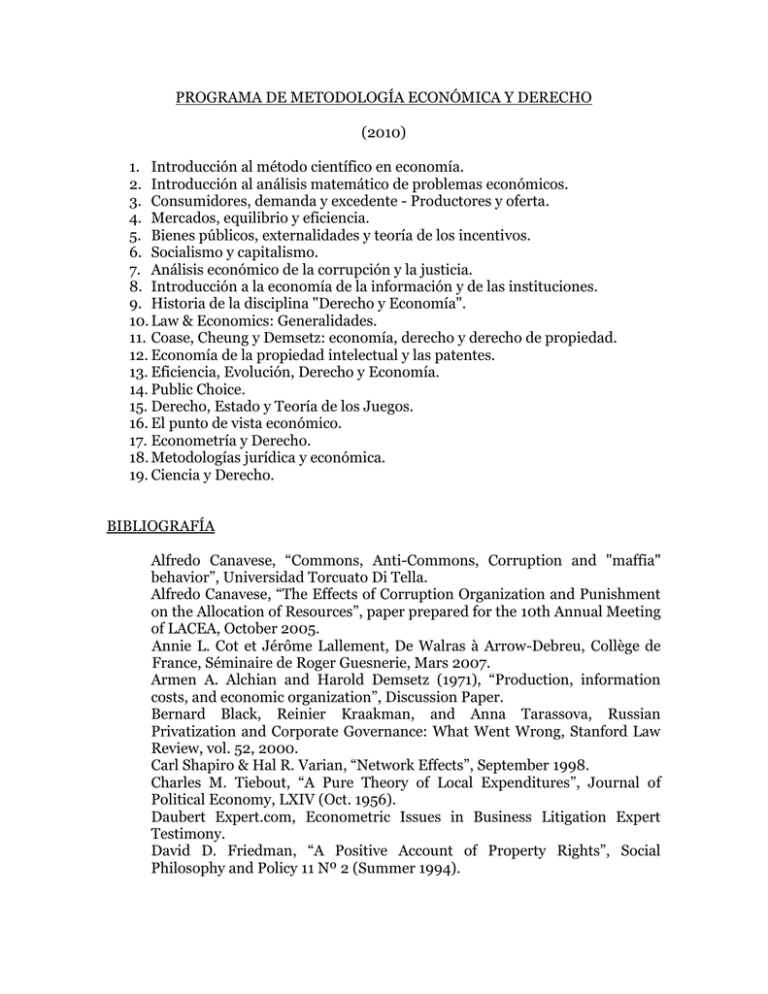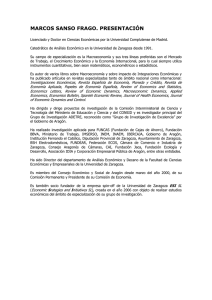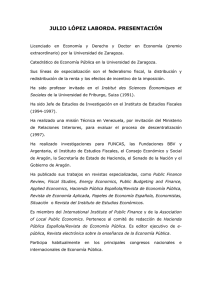PROGRAMA DE METODOLOGÍA ECONÓMICA Y DERECHO (2010)
Anuncio

PROGRAMA DE METODOLOGÍA ECONÓMICA Y DERECHO (2010) 1. Introducción al método científico en economía. 2. Introducción al análisis matemático de problemas económicos. 3. Consumidores, demanda y excedente - Productores y oferta. 4. Mercados, equilibrio y eficiencia. 5. Bienes públicos, externalidades y teoría de los incentivos. 6. Socialismo y capitalismo. 7. Análisis económico de la corrupción y la justicia. 8. Introducción a la economía de la información y de las instituciones. 9. Historia de la disciplina "Derecho y Economía". 10. Law & Economics: Generalidades. 11. Coase, Cheung y Demsetz: economía, derecho y derecho de propiedad. 12. Economía de la propiedad intelectual y las patentes. 13. Eficiencia, Evolución, Derecho y Economía. 14. Public Choice. 15. Derecho, Estado y Teoría de los Juegos. 16. El punto de vista económico. 17. Econometría y Derecho. 18. Metodologías jurídica y económica. 19. Ciencia y Derecho. BIBLIOGRAFÍA Alfredo Canavese, “Commons, Anti-Commons, Corruption and "maffia" behavior”, Universidad Torcuato Di Tella. Alfredo Canavese, “The Effects of Corruption Organization and Punishment on the Allocation of Resources”, paper prepared for the 10th Annual Meeting of LACEA, October 2005. Annie L. Cot et Jérôme Lallement, De Walras à Arrow-Debreu, Collège de France, Séminaire de Roger Guesnerie, Mars 2007. Armen A. Alchian and Harold Demsetz (1971), “Production, information costs, and economic organization”, Discussion Paper. Bernard Black, Reinier Kraakman, and Anna Tarassova, Russian Privatization and Corporate Governance: What Went Wrong, Stanford Law Review, vol. 52, 2000. Carl Shapiro & Hal R. Varian, “Network Effects”, September 1998. Charles M. Tiebout, “A Pure Theory of Local Expenditures”, Journal of Political Economy, LXIV (Oct. 1956). Daubert Expert.com, Econometric Issues in Business Litigation Expert Testimony. David D. Friedman, “A Positive Account of Property Rights”, Social Philosophy and Policy 11 Nº 2 (Summer 1994). David Friedman, Price Theory: An Intermediate Text, South-Western Publishing Co., 1990. David Goodstein, How Science Works, in Federal Judicial Center, 1999. David P. Baron, “Design of Regulatory Mechanisms and Institutions”, Handbook of Industrial Organization, Vol. II (ed. R. Schmalensee and R.D. Willig), Elsevier, 1989. Dennis C. Mueller, Public Choice III, Cambridge University Press 2003. Dimitris Milonakis, “New Market Socialism: A Case for Rejuvenation or Inspired Alchemy?”, Fourth Annual Conference of the European Society for the History of Economic Thought, Graz, Austria, February 2000. Donghyun Park, The Meaning of Competition: A Graphical Exposition, Journal of Economic Education, Fall 1998. Douglass North, Economic Performance Through Time: The Limits to Knowledge, The American Economic Review, 84:3, 1994. Duncan K. Foley, Notes on Ideology and Methodology, unpublished, 1989. E. H. Clarke, Multipart pricing of public goods, Public Choice, 1971. Edgardo Enrique Zablotsky, “A Public Choice approach to military coups d‟état”, CEMA, August 1992. Eduardo Engel, Ronald Fischer and Alexander Galetovic (July 2007) “The Basic Public Finance of Public-Private Partnerships” Ejan Mackaay, “History of Law and Economics”, in Boudewijn Bouckaert & Gerrit De Geest (ed.), Encyclopedia of Law and Economics, Publishers Edward Elgar and the University of Ghent, Copyright 1996-2000 Bouckaert and De Geest. Ejan MacKaay, “Le droit saisi par le jeu”, Droit et Société 17/18 – 1991 Enrico Barone, “Il Ministro della produzione nello stato collettivista”, Giornale degli Economisti, 1908. Enrique A. Bour, 2010, Lecturas de Filosofía de la Ciencia del Derecho, Estadística y Econometría. Enrique A. Bour, Teoría Económica y Reforma del Estado, en FIEL (1987) El Fracaso del Estatismo, Una Propuesta para la Reforma del Sector Público Argentino, Sudamericana-Planeta. Enrique Bour y Carlos Carman (2003), “Cables Sueltos”. Enrique Bour, 2009, Lecturas de Metodología Económica y Derecho. Enrique Bour, 2009, Tratado de Microeconomía. Ermano Fegatilli et Nicolas Petit, “Économétrie du droit de la concurrence – Un essai de conceptualisation”, Mar. 2008. F.M. Taylor, The Guidance of Production in a Socialist State, American Economic Review, 19 (1929). Fernando Jeannot, “Fluctuaciones cíclicas en Schumpeter”. Red de Revistas Científicas de América Latina y el Caribe, España y Portugal. FIEL, La Regulación de la Competencia y de los Servicios Públicos, 1998. Francesco Parisi, “The Formation of Customary Law”, 96th Annual Conference of the American Political Science Association, Washington, D.C., August 31-September 3, 2000 Francesco Parisi, Ben Depoorter and Norbert Schulz, “Duality in Property: Commons and Anticommons”, Int. Rev. of Law and Economics, Vol. 25, Nº 4, 2005 Friedrich Hayek, The Use of Knowledge in Society, reprinted from The American Economic Review, XXXV, Nº 4, September 1945. Gary S. Becker, “The Economic Way of Looking at Life”, Nobel lecture, Dec. 1992. Geoffrey M. Heal, The Theory of Economic Planning, North-Holland Publishing Company, 1970 (Versión al español: Teoría de la planificación económica, Bosch, 1977). George J. Stigler, “The theory of economic regulation”, Bell Journal of Economics and Management Science 2 (spring): 1971. George J. Stigler, The Economics of Information, The Journal of Political Economy, Vol. 69, No. 3 (Jun., 1961). Gordon Tullock, “Government Spending”, 2002. Guillermo Owen, Game Theory, Academic Press, 3rd ed., 1995 H. Beyer, “Ronald H. Coase y su contribución a la teoría económica y del derecho”, Estudios Públicos, 1992. H. Demsetz, “Hacia una teoría de los derechos de propiedad”, trad. American Economic Review, May 1967. Hal R. Varian, A Solution to the Problem of Externalities when Agents are Well-Informed, 1989, Technical Report. Hal R. Varian, Microeconomía Intermedia: Un enfoque actual, Antoni Bosch editor, 2005. Heico Kerkmeester, “Methodology: General”, in Boudewijn Bouckaert & Gerrit De Geest (ed.), Encyclopedia of Law and Economics, Edward Elgar Publishing (November 2000). Herbert Scarf, “Equilibrium Economics and Soviet Economic Reform”, Cowles Foundation Discussion Paper, November 1990. Howard R. Bowen, “The Interpretation of Voting in the Allocation of Economic Resources”, The Quarterly Journal of Economics, Vol. 58, Nº 1 (Nov., 1943). Imre Lakatos, Science and Pseudoscience. J. Henderson and R. Quandt, Microeconomic Theory: A Mathematical Approach, 2nd ed., McGraw-Hill, Inc, 1958, 1971 (Traducción: Teoría Microeconómica. Una Aproximación Matemática, Ed. Ariel). J. Mark Ramseyer, Public Choice, University of Chicago Law School, Law and Economics Working Paper, Dec. 1995. J.C. de Pablo, “Economía con desconfianza infinita”, AAEP, 2002 J.M. Buchanan “Public Choice: The Origins of a Research Program”, Center for the Study of Public Choice, George Mason University, 2003. Jacek Kochanowicz, Economic Calculation in the Socialist Commonwealth by Ludwig von Mises (1920), Introduction to 1990 Edition. Jack Hirshleifer, “Evolutionary models in Economics and Law: Cooperation versus Conflict Strategies”, Research in Law and Economics, Vol. 4, 1982, JAI Press Inc. Jack Hirshleifer, “The expanding domain of Economics”, Amer. Econ. Rev. Dec. 1985. Jack Hirshleifer, Natural economy versus political economy, UCLA Working Paper, April 1978. Jack Hirshleifer, Privacy: its Origin, function and future, Conference "The Economics and the Law of Privacy", Univ. of Chicago, Nov. 1979. Jean-Jacques Rosa, “Political Systems, Economics of Organization, and the Information Revolution (The Supply Side of Public Choice)”, European Public Choice Society Meeting, Paris, April, 2001. John E. Roemer, “Socialism”, The New Palgrave Dictionary of Economics, January, 2005. Josef Falkinger, Ernst Fehr, Simon Gächter, and Rudolf Winter-ebmer, “A simple mechanism for the efficient provision of public goods-experimental evidence”, American Economic Review, January 1998. Joseph A. Stiglitz, Whither Socialism?, 1994, The MIT Press. Juan Andrés Fontaine, “El punto de vista económico”, Estudios Públicos 2 (1981) K. J. Arrow y L. Hurwicz, Descentralization and Computation in Resource Allocation, in Essays in Economics in Honour of Harold Hotelling (ed. por R. Pfouts), Chapel Hill, University of North-Carolina Press, 1960. Karl Popper, The Logic of Scientific Knowledge, 1959, New York. (Traducción: La Lógica de la Investigación Científica, Tecnos, Madrid, 1985). Karl Sigmund, “John Maynard Smith and Evolutionary Game Theory”, Fakultaet fuer Mathematik, University of Vienna and IIASA, Laxenburg, Austria. KC Border, “Private Information and Trade: An Introduction”, California Institute of Technology, Spring 2002. Kelley L. Ross, Rent-Seeking, Public Choice, and the Prisoner‟s Dilema. Ken Binmore, “Game Theory and Institutions”, Economic Learning and Social Evolution (ELSE) Centre. Krueger, Anne (1974). "The Political Economy of the Rent-Seeking Society". American Economic Review 64. Lawrence A. Boland, The Methodology of Economic Model Building, Routledge, 2000. Leonid Hurwicz, But Who Will Guard the Guardians? May 13, 1998. M. Morishima, Marx’s Economics, Cambridge University Press, 1973. Mark Geistfeld, “The Role(s) of Economic Analysis in Tort Law”, 2003. Maxim Boycko, Andrei Shleifer, and Robert Vishny, Privatizing Russia, Cambridge, MA: M.I.T. Press, 1995, Reviewed by Brad De Long. Michael D. Intriligator, Optimización Matemática y Teoría económica, Prentice-Hall International, 1971, Cap. 1. Michael Intriligator, Ronald G. Bodkin and Cheng Hsiao, Econometric models, techniques and applications, © 1996, 1978 by Prentice-Hall, Inc. Milton Friedman, The Methodology of Positive Economics, 1953, in "Essays in Positive Economics". Oliver E. Williamson, “The New Institutional Economics: Taking Stock, Looking Ahead”, Journal of Economic Literature, Vol. XXXVIII (September 2000). Oscar Lange, On the Economic Theory of Socialism, Review of Economic Studies, Nº 1 and 2 (1936-1937). Oskar Lange, “The Computer and the Market”, in Socialism, Capitalism, & Economic Growth – Essays presented to Maurice Dobb (ed. C. H. Feinstein), Cambridge University Press, 1967. Osvaldo H. Schenone, An Economic Approach to Corruption, extracted from Osvaldo H. Schenone and Samuel Gregg, The Scourge of Corruption, Michigan, 2002. Padraig Dixon and Christine Greenhalgh, “The Economics of Intellectual Property: A Review to Identify Themes for Future Research”, November 2002. Paul Johnson, Modern Times, The World from the Twenties to the Eighties, Harper & Row, Publishers, 1983. (Traducción: Tiempos Modernos, Homo Legens, Madrid, 2007). Paul Samuelson, “Aspects of Public Expenditure Theories”, The Review of Economics and Statistics, Vol. 40, Nº 4 (Nov., 1958). Paul Samuelson, “Diagrammatic Exposition of a Theory of Public Expenditure”, The Review of Economics and Statistics, Vol. 37, Issue 4 (Nov., 1955). Paul Samuelson, “The Pure Theory of Public Expenditure”, The Review of Economics and Statistics, vol. 36, Iss. 4 (Nov. 1954). Peter J. Hammond, Competitive Market Mechanisms as Social Choice Procedures, July 2007. Pierre Lemieux, “The Public Choice Revolution”, Regulation, Fall 2004. R. H. Coase, “The Institutional Structure of Production”, Amer. Ec. Rev., 82:4, Sep 1992. Ray Rees, “The Theory of Principal-Agent: Part 1”, Discussion Paper, Oct. 1984. Richard A. Posner (1977), Economic Analysis of Law, 2nd ed., Boston, Little, Brown. Richard A. Posner, Theories of Economic Regulation, May 1974. Richard Dawkins, The Selfish Gene, Oxford University Press, 2nd edition, trade paperback, Sept. 1990. (Traducción: Richard Dawkins, El gen egoísta. Las bases biológicas de nuestra conducta, Salvat, 1989). Robert Ellickson, “Trends in Legal Scholarship: A Statistical Study”, Journal of Legal Studies, Vol. 28, January 2000. Robert Gibbons, A Primer in Game Theory. Harvester Wheatsheaf, 1992 Robert L. Formaini “James M. Buchanan – The Creation of Public Choice Theory», Economic Insights, Federal Bank of Dallas, Vol. 8 Nº 2, 2003. Roberto Serrano, The Theory of Implementation of Social Choice Rules, Working Paper, September 2003, Institute for Advanced Study, The School of Social Science. Roger B. Myerson, “Justice, Institutions and Multiple Equilibria”, Jan. 2004 and Chicago Journal of International Law 5 (Summer 2004). Roger B. Myerson, “Learning from Schelling‟s „Strategy of Conflict”, conference, University of Maryland in honor of Thomas C. Schelling, Sept. 2006. Roger B. Myerson, Fundamental Theory of Institutions: A Lecture in Honor of Leo Hurwicz, The Hurwicz Lecture, presented at the North American Meetings of the Econometric Society, at the University of Minnesota, on June 22, 2006. Roger E. Myerson (2008), “The autocrat‟s problem and foundations of the constitutional state”, American Political Science Review 102(1). Ronald Coase, The Institutional Structure of Production, American Economic Review, 82:4, September 1992. Ronald Coase, The Problem of social cost, The Journal of Law and Economics, 3, 1960. Russell B. Korobkin and Thomas S. Ulen, “Law and Behavioral Science: Removing the Rationality Assumption from Law and Economics”, California Law Review, Vol. 88, 2000. Secretaría de Estado de Hacienda, Reglas Macro-Fiscales, Instituciones e Instrumentos Presupuestarios Plurianuales, Mayo 1999. Stanley M. Besen & Leo J. Raskind, “An Introduction to the Law and Economics of Intellectual Property”, (The Journal of Economic Perspectives, Volume 5, Issue 1, Winter, 1991). Stanley M. Besen and Leo J. Raskind, “An Introduction to the Law and Economics of Intellectual Property” (The Journal of Economic Perspectives, Vol. 5, Issue 1, Winter, 1991). T. Groves and J. Ledyard, Optimal Allocation of public goods: a solution to the “Free Rider”, Econometrica, 45, 1977 Taro Yamane, Mathematics for Economists – An Elementary Survey, Prentice-Hall, Inc., 1962. The Concise Encyclopedia of Economics, by William F. Shughart II Thomas Kuhn, La Estructura de las Revoluciones Científicas, Fondo de Cultura Económica, 1962. Thomas S. Ulen, “A Nobel Prize in Legal Science: theory, empirical work, and the scientific method in the study of the law”, Illinois Law and Economics Working Paper Series, University of Illinois Law Review, 2002. Tom Apostol, Calculus, Volume I, One-Variable Calculus, with an Introduction to Linear Algebra, Second Edition, John Wiley & Sons, Inc., 1967. UNESCO, “Basic Notions about Copyright and Neighbouring Rights”. Vito Tanzi and Hamid R. Davoodi, “Corruption, Public Investment, and Growth”, IMF Working Paper, October 1997. W. Vickrey, Counterspeculation, auctions and competitive sealed tenders, Journal of Finance, 16, 1961. Wesley Salmon, “Rational Prediction”, 32 Brit. J. Phil. Sci. 115 (1981). William J. Baumol, John C. Panzar, & Robert D. Willig, 1982, Contestable Markets and the Theory of Industry Structure, Harcourt Brace Jovanovich, Inc. Williamson, Oliver E., The New Institutional Economics: Taking Stock, Looking Ahead, Journ. of Economic Literature, 38(3), Sept. 2000. Yan Chen and J. Ledyard, Mechanism Design Experiments, October 2006.

